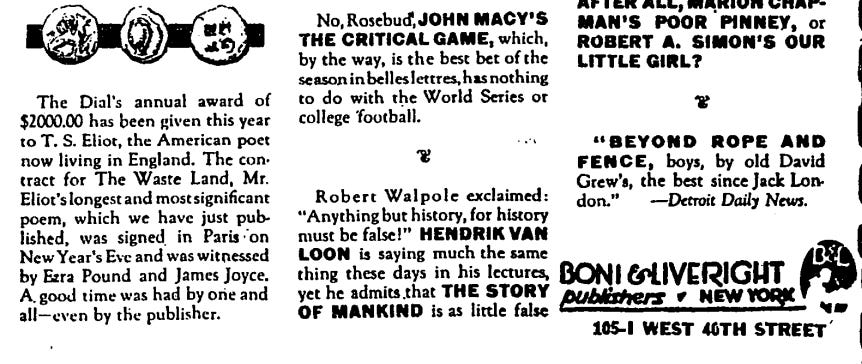Practical Chat
How to make small talk about T.S. Eliot
It’s now one hundred years since T.S. Eliot published The Waste Land, and there will be no end of talk about it, especially in April. So we’re all going need some better ice-breakers than ‘did you know his name is an anagram of TOILETS’.
Here, culled from years of research, are a handful of little-known Eliot facts to throw into any centenary conversation, whether stopping for coffee in the Hofgarten, or luncheon at the Cannon Street Hotel followed by a weekend at the Metropole.
N.B. one of them may not be true.
The rules of the T.S. Eliot Prize for Poetry (won this week by Joelle Taylor’s extraordinary C+nto and Othered Poems) state that ‘a “book” shall be defined as having at least 48 pages’. The 40 pages of Eliot’s first book, Prufrock, and other observations (1917) would therefore not have qualified — and the padding of The Waste Land with notes might have been considered a bit of a stretch.
According to an advertisement placed by the publishers Boni & Liveright in December 1922, the contract for The Waste Land was signed in the presence of Ezra Pound and James Joyce in Paris on New Year’s Eve, and ‘a good time was had by one and all’.
The Waste Land manuscript contains any number of lines that might now be famous if they hadn’t been edited by the red pen of Ezra Pound e.g. ‘Phantasmal gnomes, burrowing in brick and stone and steel!’; ‘Something which we knew must be a dawn — / A different darkness flowed above the clouds’; ‘My god man there’s bears on it’.
As the editor of W.H. Auden’s intensely strange early work The Orators (1932), Eliot removed the phrase ‘the fucked hen’ from a list of ‘kinds of enemy face’.
In 1934, Eliot wrote of Winston Churchill’s ‘second-rate prose’: ‘at the end of a period we seem to observe the author pause for the invariable burst of hand-clapping’.
In 1947, Eliot wrote to a correspondent about Finnegans Wake (1939): ‘NO, I have certainly not read it’ — despite the fact that he edited a selection of Joyce’s prose called Introducing James Joyce in 1942. For good measure, he also admitted: ‘I am not sure that I have even read all of the Canterbury Tales’.
Eliot played the disembodied Fourth Tempter in the film version of his play Murder in the Cathedral (1951). The book of the film featured an image of his recorded voice.
T.S. Eliot’s last public statement was a telegram sent in 1964 for Jacqueline Kennedy to read out at the start of works for the Kennedy Center for Performing Arts. In it, the critic who once argued that ‘impersonality’ was necessary in the writing of poetry paid tribute to ‘the value of the human spirit in an increasingly impersonal world’.
The original title of the ‘Notes’ to The Waste Land was ‘P.S. Eliot’.
For more modernist rabbit holes, there’s a just-published article here on Eliot and the cryptic crossword: https://publicdomainreview.org/essay/beastly-clues





PS I Love You?